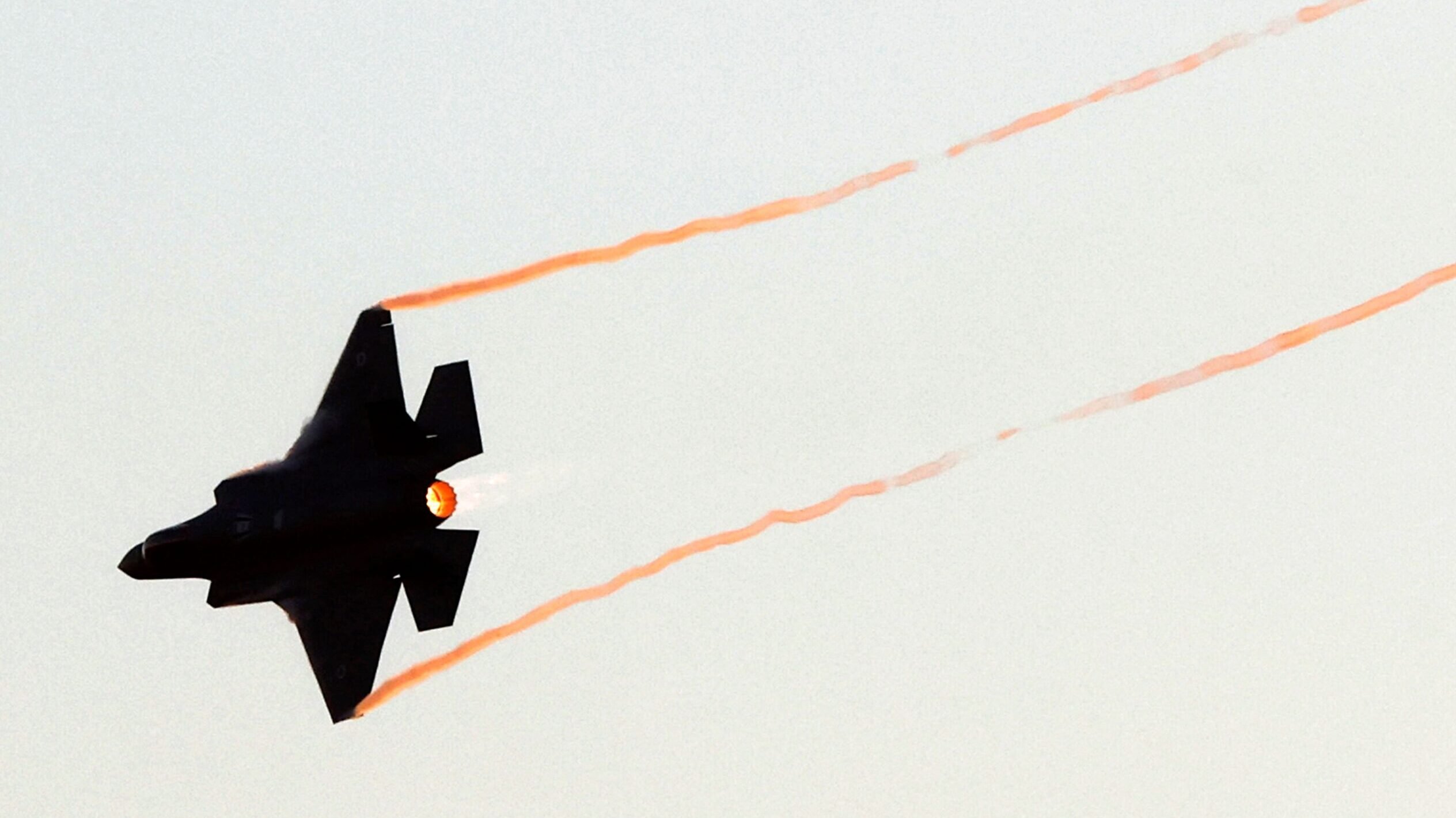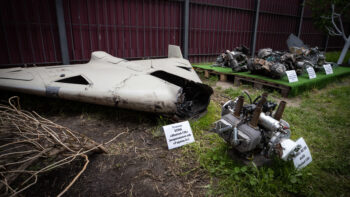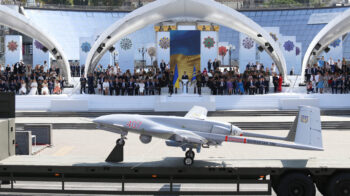
An Israeli Air Force F-35 Lightning II fighter jet performs during a graduation ceremony of Israeli Air Force pilots at the Hatzerim base in the Negev desert, near the southern city of Beer Sheva, on June 24, 2021. (Photo by JACK GUEZ / AFP) (Photo by JACK GUEZ/AFP via Getty Images)
TEL AVIV: When Israeli defense minister Benny Gantz announced on June 20 the existence of a new regional joint air defense network, known as the Middle East Air Defense Alliance (MEAD), few details were available, including which countries would take part and the depth of the agreement.
Now it appears that there are ongoing discussions with a number of countries who are willing to place Israeli-made sensors on their territory to facilitate combating the threat of Iranian-made missiles and drones.
US Central Command has been the driving force in helping to develop the agreement, which would link Israel with Saudi Arabia, Qatar, Egypt, the United Arab Emirates, Bahrain, and Jordan. The idea that such a coalition could agree to work together would seem impossible even just three years ago; while Israel now has diplomatic ties with Egypt, Jordan, the UAE, and Bahrain, it does not have formal relations with either Saudi Arabia or Qatar.
According to a report in the Wall Street Journal, the first formal meeting of the group occurred at the Egyptian resort town of Sharm el Sheikh. The Journal reported that Lt. Gen. Aviv Kohavi, the chief of staff of the Israel Defense Forces, attended the summit, as did Gen. Fayyadh bin Hamed Al Ruwaili, the chief of staff of the Saudi armed forces. (A US Central Command spokesperson told the WSJ only that it “maintains a firm commitment to increasing regional cooperation and developing integrated air and missile defense architecture to protect our force and our regional partners.”)
Israeli defense sources say that while the agreement is still being hammered out in a series of working groups, the general idea is to set up a unified communications systems that will connect all the early-warning sensors deployed by the participating countries. This system will be supervised by CENTCOM, and will allow real-time early warning on developing aerial threats, like armed UAV’s or ballistic and cruise missiles.
Those sources also said that when the agreement is formalized, some of the participating countries may purchase Israeli-made long-range early warning radars — putting Israeli defense technology on the soil of nations that have, at best, historically strained relations with Israel’s military, and who under different circumstances might be more concerned about what data the sensors may be sending back to Jerusalem than the threat from Iran. (While it is unclear what sensors may be under discussion, sources say a long-range system developed by Israeli firm Elta is one option.)
RELATED: A Middle East NATO? A missile defense network with Israel? Major shifts brewing in region
Breaking Defense has previously reported on tentative interest from Saudi Arabia and the UAE for Israeli-made air defense capabilities; should those deals come to fruition they would likely be integrated into this network as well.
One specific discussion has centered around the possible use of Socotra Island, technically part of Yemen but under de facto control of the UAE, as a potential location for sensors, but nothing has been decided on that front, sources tell Breaking Defense.
Socotra Island has been a point of fascinating for several years. In 2020, The Middle East Monitor reported that the UAE and Israel were developing a plan to establish a spy base there. Sources have since confirmed that Israel has “some presence” on the island, without divulging details.
It is expected that the newly-formed coalition will be a discussion point for President Joe Biden when he arrives in the region next month, with visits to both Israel and Saudi Arabia on the docket. Haaretz reported earlier this month that there is some hope Saudi Arabia will make its membership to this coalition public during Biden’s visit.
According to a report from the Middle East Media Research Institute, “Biden will apparently also try to allay the Gulf states’ concern about the possible renewal of the stalled negotiations with Iran towards a return to the 2015 nuclear deal. In addition, many reports in the Arab press state that Biden and his fellow leaders are expected to discuss the forming of a NATO-like military alliance between the countries of the region, including Israel, in order to confront the shared security threats, chief of them Iran.”
While a NATO-like coalition is extremely unlikely — NATO members are required to come to each other’s aid should any one nation be attacked, and the intertwined political interests in the Middle East make that effectively impossible to pull off — it is clear that the regional powers are coming to the conclusion they need to tighten defense ties. The air defense coalition may be only the starting point.
Norway’s top officer on his ‘biggest challenge,’ next frigate and new NATO neighbors
Gen. Eirik Kristoffersen, Norway’s Chief of Defense, talks to Breaking Defense about his plans for spending on new frigates and subs, the challenges of upgrading Norway’s “digital backbone” and refilling the military’s stocks.


























